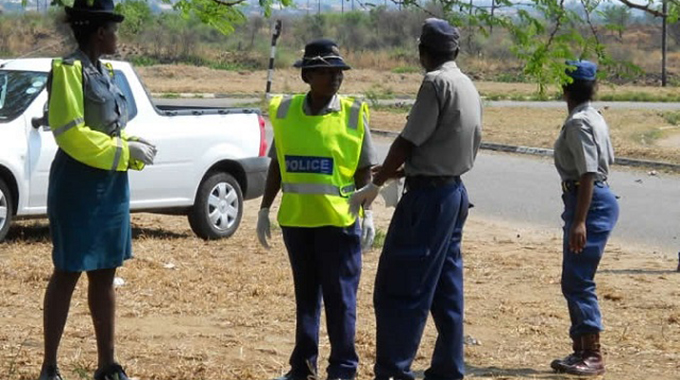Source: Police must control traffic at dysfunctional robot intersections | The Herald December 13, 2019
Parliament’s Privileges Committee chaired by Chiefs Council president Fortune Charumbira’s punitive measures against four Members of Parliament over their conduct in $400 000 bribery allegations showed that the august House is capable of reining in its members.
Mr Speaker Sir, what the report serves to demonstrate is that Parliament, despite being constituted by legislators from across the political divide, is capable of dealing with its own challenges, including its members.
Without taking anything away from the accused legislators nor casting aspersions on them, Mr Speaker Sir, the bigger picture is that the legislative assembly was equal to the challenge at hand in terms of dealing with a disciplinary case that had been presented before it.
Chief Charumbira delivered a detailed report last week where he analysed evidence on behalf of the committee before recommending that the four legislators be punished in a case in which they were accused of soliciting a $400 000 bribe from a local businessman Mr James Ross Goddard of JRG Contracting (Pvt) Ltd, as “facilitation fee” to help his company secure a mining contract at Hwange Colliery.
It would be recalled Mr Speaker Sir, that the Privileges Committee barred the four MPs from sitting on the Parliamentary Portfolio Committee on Mines and Mining Development for bringing the House into disrepute for the rest of the life of the current Parliament.
They were also directed to apologise to the National Assembly for their conduct, and are now set to lose a day’s sitting allowance.
Chief Charumbira said this when he tabled the Privileges Committee report in the National Assembly last week.
The committee was set up early this year to investigate Mr Temba Mliswa, Gokwe Kabuyuni MP Cde Leonard Chikomba (Zanu-PF), Magwegwe MP Mr Anele Ndebele and Binga North representative Mr Prince Sibanda (both MDC-Alliance).
As fate would have it, legislators from both political parties — Zanu-PF and MDC-Alliance — were implicated, including Mr Mliswa, an independent legislator, thus bringing to test Parliament’s ability to be firm and fair.
Clearly, Mr Speaker Sir, what was on trial was not necessarily the legislators in question, but Parliament as an institution, in particular on how effective it is in dealing with issues that have the potential to undermine its integrity.
While the committee cleared the four of the main charge of soliciting for a bribe owing to inadequate evidence, it came down hard on them for bringing the august House into disrepute after they convened meetings at night, away from Parliament Building, under the guise of holding official business.
It will also be recalled Mr Speaker Sir, that Chief Charumbira indicated that there was need to allow the four to respond to the Privileges Committee’s report before all other members debate it.
Ultimately, the House will decide to adopt the report or not, or in part.
Clearly, what this means, Mr Speaker Sir, is that Parliament has adequate mechanisms to deal with challenges that might visit it, either from its members, or from those outside its precinct.
Admittedly, Mr Speaker Sir, there were some who were murmuring on why the Privileges Committee appeared to be lenient to the legislators.
Some even went on to suggest that Parliament might have been trying to balance the inherent political undertones or political dynamics that might have been at play.
Those who attacked the committee for being lenient cited the observation in the report; the inconsistencies of evidence by the legislators.
For example, the report indicated that Mr Ndebele had gone to Mr Goddard’s office as a legal counsel for Mr Chikomba, who was owed money by Shepherd Tundiya, the facilitator of the meeting, yet the opposition legislator sat in his car when Mr Chikomba raised the issue of money and even submitted his banking details.
Questions were also raised, Mr Speaker Sir, on how a US$2 000 debt could have ballooned to $400 000, even by the most outrageous exchange rate.
“This begs the question, would a debt of US$2 000 have taken a businessperson of Mr Goddard’s stature to travel all the way from Shangani to Harare at night, accompanied by his mining director to only give assurance to four MPs that he would take over and pay the debt on behalf of Tundiya?” queried Chief Charumbira.
“This puts to credence the allegations relating to solicitation. In response to a question why US$2 100 had risen to $400 000, Honourable Chikomba characterised it as a casual comment.”
But those who raised the above issues missed the bigger picture; that Parliament did not seek to sweep the matter under the carpet.
They missed the point that Parliament had all the courage to deal with its members who are perceived to engage in errant behaviour.
Put differently, Mr Speaker Sir, Parliament, through the Privileges Committee, fulfilled the adage, “justice must not only be done, but must be seen to be done.”
What this means is that the four legislators have learnt their lessons, if there were lessons to be learnt.
Needless to add, Mr Speaker Sir, that a lot would be seen from the response they will make when they take the floor to respond to the committee report.
After everything has been said and done, Mr Speaker Sir, Parliament can raise its head high to say it discharged its obligations consistent with what society expected.
At the same time, Parliament can still draw some lessons from the case to see possible areas requiring improvement in dealing with problems that would have visited it.
Newer Post
‘AirZim to relaunch in 2020 with 5 planes’ Older Post
Economic woes, a passing phase- Mudenda 
COMMENTS